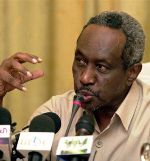Sudanese vice president: Threats of sanctions won’t help Darfur
By RAWYA RAGEH, Associated Press Writer
KHARTOUM, Sudan, Sep 15, 2004 (AP) — Threats of sanctions against Sudan because of its handling of the Darfur crisis will only make matters worse, the country’s vice president said Tuesday after meeting a senior U.S. aid official.
 At the United Nations, the United States softened its threat of oil sanctions against Sudan to try to get Security Council approval for a resolution pressuring Khartoum to rein in Arab militias accused of attacking civilians.
At the United Nations, the United States softened its threat of oil sanctions against Sudan to try to get Security Council approval for a resolution pressuring Khartoum to rein in Arab militias accused of attacking civilians.
The revised U.S. resolution, obtained by The Associated Press, still raises the possibility of punitive diplomatic and economic measures against Sudan, particularly against its oil industry, if the government doesn’t act quickly against the militias, known as the Janjaweed.
The original U.S. resolution introduced last week — which China threatened to veto — declared that the Security Council “will take further actions” against the government if it doesn’t comply with U.N. resolutions. The revised text declares that the council “shall consider taking additional measures.”
At the Darfur peace talks in Nigeria, African leaders tried on Tuesday to push past a stalemate. Rebels said the meeting would determine whether the internationally brokered, three-week-old peace talks keep going. Little progress has been made so far.
In Sudan, Vice President Ali Osman Mohammed Taha said he discussed “consolidating” Darfur’s security situation with visiting USAID chief Andrew Natsios.
“We have agreed to many points to the effect that if we have proper coordination from all sides, then the government will be ready to see to it that all the militias in Darfur would come to abide and respect the cease-fire arrangement,” Taha said without elaborating.
Sudan’s government rejects accusations that it backs the militias, drawn from Arab herders, and their violent campaign to remove African farmers from Darfur. The farmers instigated a rebel uprising against the government in February 2003 over dwindling resources.
The United States has labeled the crisis genocide and advocates sanctions.
“I think we need to work in a constructive manner rather than to pursue the policy of making pressures and sanctions, which will only help to deteriorate the situation,” Taha said.
On Monday, European Union foreign ministers urged Sudan to implement a cease-fire in Darfur or face U.N. sanctions, including a possible oil embargo. They also called for the United Nations to “immediately investigate” whether atrocities in Darfur constitute genocide.
In Egypt, Sudanese Foreign Minister Mustafa Osman Ismail said his government “is very concerned” about the U.S. draft resolution to the United Nations, calling it “unbalanced and isolated.”
He appeared to secure some support from Arab League nations, whose foreign ministers met in Cairo and who “praised the steps taken by the Sudanese government” toward meeting U.N. requirements in Darfur.
Also Tuesday, Sudan’s Minister of Humanitarian Affairs Ibrahim Hamid said that U.N. death estimates among Darfur’s displaced were mistaken and claimed the health situation was “normal.” The U.N. calls the region the world’s worst humanitarian disaster.
The U.N. World Health Organization released the results of a survey Monday showing between 6,000 and 10,000 of the people who have fled their homes are dying from disease and violence every month. Dr. David Nabarro, Geneva-based head of crisis operations for the WHO, said the survey results show 50,000 people have died in Darfur since the start of the conflict. Previous U.N. estimates said 30,000 people had died in the crisis.
Hamid did not offer Sudanese government death toll figures but claimed: “The death rate is decreasing. … We have standards by which we measure the health situation … and it is normal.”
Natsios said USAID projects rising fatalities in the next three months. He did not give specific figures but said “the crisis has not ended.”
